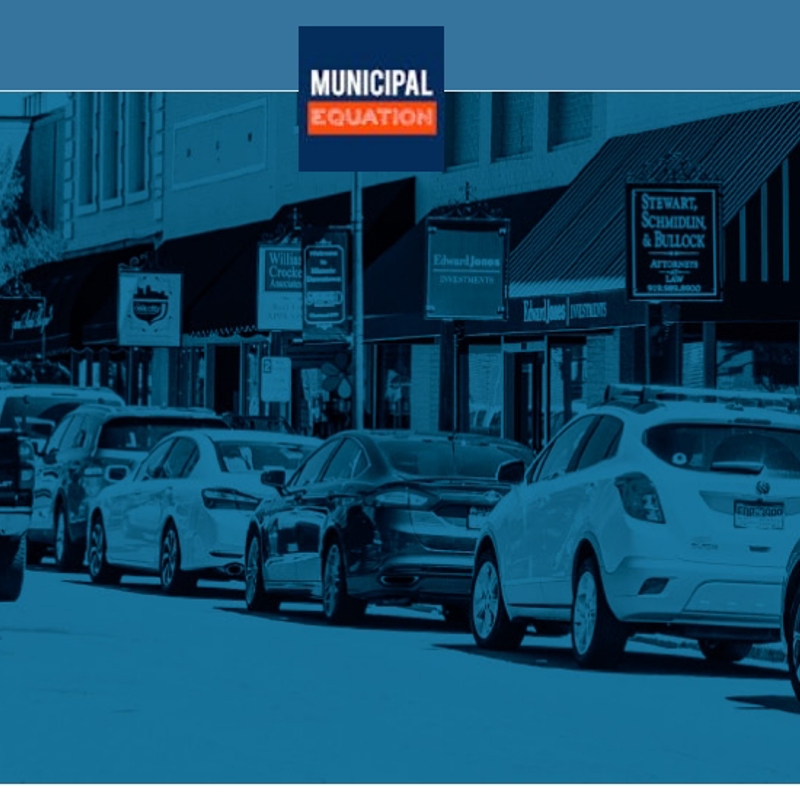Mark-Anthony Middleton Finds Success Through Crises in His NCLM Presidency
Q1 2025 | Vol. 75, Issue 1
Mark-Anthony Middleton is no stranger to leadership positions. In Durham, he now stands as a senior member of the council in his eighth year elected and serves as Mayor Pro Tem. At Abundant Hope Christian Church, he presides as CEO and senior pastor. In each, as in any director, manager or principal position, the job requires a strict balance of strategy and action—of both keeping large, forward-looking ambitions within target and reacting to the crises. Of reacting to the now.
Middleton’s time atop the NC League of Municipalities has proved no different, albeit through a larger, statewide scope. The ambitions were bigger—and so were the crises. Middleton’s preparation and experience at the local level proved more than up to the task. As his Presidential tenure comes to a conclusion this April at CityVision 2025, Middleton looks back at a year of challenge and accomplishment.
THE VISION
Middleton ascended to the League presidency after many years on the Board of Directors occupying Durham’s Large City Representative seat, reserved for just six cities in North Carolina. That position, as a representative of several hundred thousand people, brings with it a unique perspective, according to Middleton. “Durham is a big, dynamic city,” he said. “I wanted to bring that full understanding to the depth and breadth of the work the League does.”
The connection between big cities and smaller towns—from the perspective of a big city representative—became a major component of Middleton’s vision. “I wanted to push back against the mythology and notion that big cities can’t get together and coalesce around issues with smaller towns. That idea of the urban-rural divide was important for me to overcome,” Middleton said. “We all want safe streets, we all want good schools, we all want internet connectivity, we all want clean water.”
Part of that perspective, and a key part of Middleton’s approach to leadership, is the idea of access and relationships. At home in Durham, Middleton has prioritized a seat at the table for all members of the community. Speaking with Southern City Magazine in 2020, Middleton shared the two questions that define his approach: “Who is not being heard?” and “How many people are being written off because of the absence of people to speak up for them?” In Durham, a rapidly-evolving city filled with both rich history and new people with new ideas, the solution for Middleton is outreach and to value the hard-to-reach communities as much as the accessible ones.
With a statewide organization, however, Middleton believes that the solution is almost the inverse. It’s not finding hard-to-reach groups, but rather becoming easier to find yourself. Middleton made it a key priority to get the NC League’s name, work and impact known more across North Carolina.
“That’s an important role of the President—to be an ambassador,” Middleton said. “I’ve seen a lot of stuff get done outside of the legislative session simply because of the power of relationships and the power of talking to one another.”
Through that vision and through ever-building partnerships, the League itself has made significant strides under President Middleton. At the legislature, the League continues to be a forceful and effective advocate for North Carolina cities and towns, while around the state itself, the League has blossomed both its education programs and its direct assistance programs for member municipalities. “We have such a well-run machine here,” Middleton said.
THE CRISIS
No tenure of leadership goes smoothly from beginning to end, and the road bump that President Middleton found during his year atop the NC League was Hurricane Helene. Hitting North Carolina on September 27, Hurricane Helene’s flood waters inflicted catastrophic damage to many western municipalities, leveling entire downtowns. Cities were left without critical infrastructure, including clean water, and many residents found themselves without homes. More than 100 people were killed in the storm, which became the costliest natural disaster in the history of the state.
Under Middleton’s leadership, the League sprang into action. First, as the insurer for nearly all of the impacted municipalities, the League was quick at work to determine what help was needed and to understand the scope of the necessary response. Then, as the go-to support system for cities and towns, the League was quick at work tapping into the available disaster relief and connecting leaders with resources, including the Mutual Aid System, a robust framework designed to organize collaboration among municipalities during times of crisis.
The League has served as a key liaison between local governments, counties, state government agencies and federal officials.
In November, Middleton and League Executive Director Rose Vaughn Williams led the League’s involvement in a special convening in Morganton, which included the North Carolina Association of County Commissioners, five western regional Councils of Governments, and key legislators and leaders from both the state and federal level, including Senator Thom Tillis, then-Governor Roy Cooper, and FEMA Administrator Deanne Criswell.
“Today, mayors, county commission chairs, local government managers are all coming together with no thought to jurisdictional boundaries or partisan boundaries,” Middleton said at the gathering.
In the months and years of recovery ahead, the League has positioned itself both through its expansive, on-the-ground staff and its network of key partners to support these rebuilding communities. Middleton points to those resources—the people and the partners—as the reason the League is so well positioned not just on this crisis, but on the many issues that arise for local governments.
“Anybody who thinks that they can come in and just do this by themselves, just really doesn’t have an understanding of the lay of the land,” said Middleton. “The balance, of your vision and your response to immediate issues, is directly proportional to how much you trust and use your team.”
“I’m so proud of the way the League has positioned itself as one of the key players in bringing relief both economically and morally to the western part of our state,” said Middleton.
THE SUCCESSES AND THE FUTURE
In Middleton’s view, his accomplishments are forward-looking and should be measured as such, based on how well the League and the cities as a whole are positioned to face the challenges ahead. Even now, though, the achievements seem clear. Middleton has overseen the League as it has bolstered its foundation as a support organization and a go-to resource for municipalities. It is as evident during a crisis like Hurricane Helene as it is during the more routine times.
“It’s been an honor to serve all of our cities, and to lean into the cooperation that takes place between them,” Middleton said.
He sees for himself a continued role as ambassador, and he believes that he has established a culture of ambassadorship among the League’s Board of Directors too. “I hope under my Presidency, the board now sees itself as an active board, actively building membership, actively recruiting folks to participate in the League, ushering the next great chapter of the League’s story and continuing to push our legislative agenda,” Middleton said.
Middleton does not leave his achievements behind. Just as they stay with the League for future dividends, so too do they benefit Middleton himself. He entered the Presidency with a big city perspective to bring to the role—and he leaves the role with a League perspective to take back to Durham.
“What the League has taught me will shape my leadership in Durham,” Middleton said. “It’s taught me that you don’t have to go it alone. Even when it seems like there may be forces against you for one particular issue, there are always three more issues that you can rally around and agree on.
“When I look back over my life in public service, my presidency of the North Carolina League of Municipalities, without question, will be one of the high moments.”












